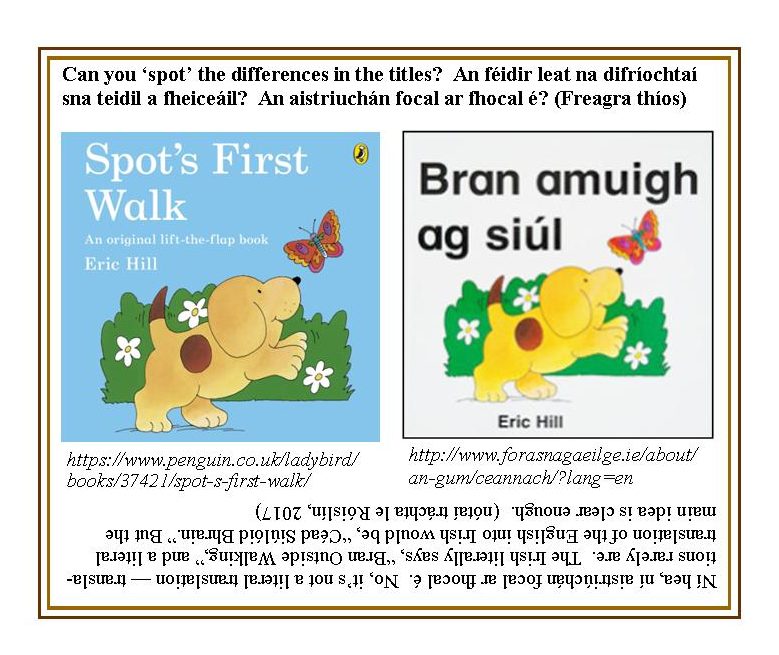A Vocabulary Comparison: ‘Spot the Puppy’ (English) and ‘Bran an Coileán’ (Irish) Posted by róislín on Apr 12, 2017 in Irish Language
(le Róislín)
Translations are hardly ever word for word or exactly literal. Languages are too idiomatic for most literal translations to flow well. We might expect this especially in songs, poetry and the Classics. But I thought it would interesting to look at a fairly simple text, and one that’s a lot of fun for learners, that is, any of the Irish translations of Eric Hill’s Spot the Puppy books. The translations are all great–but there are some noticeable differences between the two texts, even at this basic level.
First, let’s look at Spot’s name in the two texts, and then at some select phrases. Spot is called “Spot” in English for obvious reasons, as we see in the artwork — his brown spots on his tawny fur. The Irish versions, however, name him after one of the most famous dogs in Irish legend, Bran, the hound of Fionn Mac Cumhaill. Intriguingly, the Manx and Scottish Gaelic versions keep the connection to the spots. The Manx books call him “Breck” (related to the Irish “breac,” speckled) and the Gaelic ones simply call him “Spot.” At any rate, he’s “Bran” in Irish, which means we get treated to the vocative and genitive forms of his name, in various texts: (A Bhrain!, for direct address, and Bosca Bréagán Bhrain, to show possession). “Spot” wouldn’t have given us so much cleachtadh gramadaí.
Agus anois, roinnt samplaí ón téacs é féin:
Starting with the title, as explained in the graphic above — they’re actually quite different. The English makes a point of saying this is Spot’s “first” solo walk but the Irish simply indicates that the walk is outside (Spot’s First Walk vs. Bran amuigh ag siúl)
“Off you go” is translated as “As go brách leat,” which is great, but simply doesn’t need or contain the verb “go.” “As go brách leat” is more literally, “Off with you,” here in the sense of “Out you go”. The English is very idiomatic in using “get” for “Don’t get lost,” where the Irish is more straightforward with “Ná téigh ar strae.” (Don’t go astray). Some day I’ll check out some other language versions, but my hunch is that the English “get” here is so idiomatic that probably most other languages don’t use their word for “get” (i.e. obtain, acquire) for this phrase either.
On page two, the Irish is more verb-oriented, with “Ná téigh ansin …” and the English simply says “Not in there ….” Of course, starting any sentence in Irish with the word “not” requires some manipulating because there’s no single word directly equivalent to this usage, but there are various choices, here using “ná” but in other cases using “gan” or “ní.”
I love the page for the woodpecker (cnagaire), but it’s interesting to note that the English states, “That’s a funny noise” where the Irish asks “Cén cnagadh é sin?” So the Irish uses a question instead of a statement. Irish also uses a negative interrogative structure with “Nach deas an boladh é sin!” where the English states “… and that’s a nice smell.”
Does English, in general, use prepositions more than Irish (which does have plenty of them, of course)? Well, it’s too big a question to answer here but one slice of the pie is that the English text, quite smoothly, says “Now for a drink,” whereas the Irish doesn’t use any of the words than can mean “for” (including ar, chun, do, i gcomhair, le haghaidh, faoi choinne, and in somewhat more specialized phrases, as ucht, mar, ina, or ar feadh, just to name some). The Irish just says, “Deoch anois.”
Finally, a dripping wet Spot answers his mother’s question about what he’s been doing by saying “Nothing” in English, but “Seo is siúd” in Irish, which is more literally “This and that.” Among the typical Irish words for “nothing” are: tada, dada, faic, rud ar bith and a little more philosophically, neamhní. So, it’s interesting what the translator chose.
Hope you found this interesting and useful. As somebody once sang, more or less, the beginning is “a very good place to start.” – SGF — Róislín
Mionrudaí foilseacháin:
Spot’s First Walk (NY: G. P. Putnam’s Sons; London: originally Ventura Publishing, now Ladybird), 1981
Bran amuigh ag siúl (Baile Átha Cliath, An Gúm), 1982

Build vocabulary, practice pronunciation, and more with Transparent Language Online. Available anytime, anywhere, on any device.





Leave a comment: